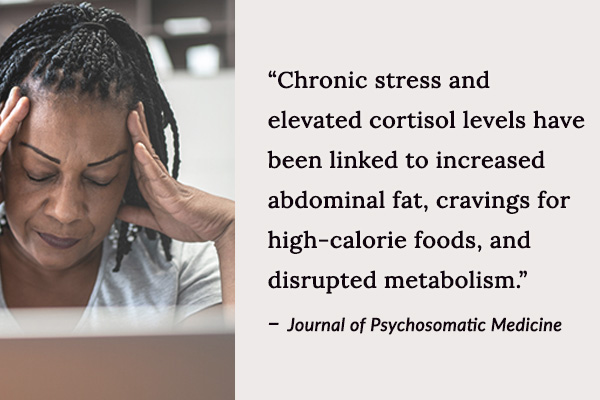Authored by Dr. Sharon Stills, NMD
In a recent CNBC survey, 53% of women said they are in a state of burnout. There’s little surprise why. It’s a lot to juggle work, relationships, raising kids and perhaps caring for older parents. And all against the backdrop of economic and global uncertainty and the lingering effects of pandemic-related changes to daily life.

5 tips to rebound from burnout
When you feel burned out, it’s an almost certain sign that your body has developed some level of adrenal imbalance. Hormones produced by the adrenal glands drive and manage the body’s response to stress. These hormones, including the major stress hormone cortisol, are activated during the body’s “fight or flight response,” that ancient system that’s designed to help us flee in the face of danger.
After this system protects us from whatever threat presented itself — whether real or perceived — the body’s stress response is intended to turn itself off and production of stress hormones drops back to normal. However, when stress is unrelenting — as it has been for many of us — the adrenals can stay on alert indefinitely and stress hormone production remains ramped up. As a result, adrenal hormones, especially cortisol, can be pushed out of balance. This leads to the troubling symptoms we associate with burnout: extreme lack of energy, crushing fatigue, brain fog and weight gain.
This is why solving burnout can’t truly happen without supporting your adrenals. So, as you start to take on your symptoms, try these steps.
Repair cortisol balance to end burnout weight gain
Under normal circumstances when you haven’t eaten for a while, your blood sugar (glucose) drops and the brain sends a message to the adrenals to release cortisol to help out.
Cortisol maintains stable glucose levels in the blood by mobilizing stored glucose, amino acids and fat to prevent blood sugar from dropping too low. It also keeps fueling your brain and body with energy in the absence of food. (Essentially, this is a function of that ancient system that if you need to flee from danger, like being chased by a wild animal, cortisol gives you the instant energy to do so.)
When we have long-term adrenal stress imbalances, however, cortisol levels are elevated in the blood and summon too much glucose. When glucose is not used for energy, it ends up stored in the form of fat — primarily abdominal fat cells (aka belly fat). Scientists know that fat cells have special receptors for cortisol. That’s a problem because there seem to be more cortisol receptors on belly fat cells than anywhere else!
So, this may sound contradictory if you are a die-hard dieter, but the way to rebalance your cortisol levels from this place of burnout is to eat regularly and eat well. Send the signal to your brain (and adrenals) that you don’t need any extra cortisol! Plan for and eat three balanced meals and two (also balanced) snacks per day. Spread them out across the day to work with your natural circadian rhythm. Use your meals and snacks as a time to relax and enjoy the foods you’re eating. This can stop further weight gain and help your body gradually let go of extra weight.
Other tips for stress hormones
Some other tips to tame your stress hormones: Cortisol follows a natural cycle that complements your circadian rhythm. Normally, cortisol is highest in the early morning. It declines gradually throughout the day to help you get ready for sleep. Because eating always bumps up cortisol, it’s ideal to eat your largest meal early in the day.
Many women snack on sweets and caffeine. They’re comforting and so easy to access. (Hello, Starbuck’s drive-through!) But this habit just worsens cortisol imbalance. Avoid sweets and caffeine.
Reach for specific micronutrient-rich foods that support your adrenals, like asparagus, avocado, cabbage, garlic, ginger and lean protein.
Love your lymph to decrease brain fog and fatigue
Another important recovery step from burnout is to help your body detox by getting your lymph moving. Your body’s lymphatic system is responsible for removing cellular waste products and other toxins from your system. When you’re under constant stress, your system may be overwhelmed with waste and toxins to dump. This can contribute to burnout’s horrible feelings of fatigue and brain fog.
So, give your lymphatic detox system some added support:
- Sweat more. Sweating helps to move and drain lymph, removing toxins along with it. Take a warm bath, go for a brisk walk, try a portable infrared sauna and explore these other simple tips to support your lymphatic system.
- Try dry brushing. Using a bath brush, use long and light strokes to brush your skin in the direction of your heart. This helps move and drain lymph. The body’s main lymph drainage point is near the heart. Dry brushing is a relaxing self-care technique all on its own!
- Use a rebounder. A quick and easy way to get your lymph moving is to jump for a few minutes on a mini rebounder trampoline. If you’re pressed for time, just a few minutes can jumpstart your circulation giving you a boost of energy and improved lymph flow.
Sleep more — at least 7-8 hours of sleep each night
It’s overnight as you sleep that so many of your body’s repair processes take place, including repair of burned out adrenals. Be in bed and sleeping by 10:00 or 10:30 p.m. at the latest. If you need to unwind, or it takes you a little bit to fall asleep, then get to bed at 9:00 or 9:30 p.m.
If your sleep is in really bad shape from stress, over production of cortisol could be the culprit and you will need to take a few extra steps to get your sleep back on track. To help do this, you can try a really good natural sleep supplement with L-theanine and passion flower for quieting cortisol production and calming your thoughts. Other helpful nutrients for sleep include calcium and magnesium — combined, they have a very relaxing effect, especially if stress creates muscle tension.
Also, stop screen time from messing with your sleep! Put your electronics to bed at least two hours before your own bedtime to avoid sleep-disrupting blue light. And sleep with your room in total darkness. Here are some more doctor-approved sleep secrets to help you get the restorative sleep you need.
Opt for exercise that calms you down
When your adrenals are already in a state of hyper arousal, it’s helpful to choose forms of physical exercise that calm you down instead of rev you up. Walking, yoga, Tai Chi and other forms of low impact exercise are easy ways to boost your energy levels. They also work wonders for adrenal imbalance by “sopping up” excess cortisol circulating in your system. This helps you feel more relaxed and allows the adrenals to rest. On the other hand, high intensity exercise can trigger cortisol production. Listen to your body. If a certain form of exercise makes your energy levels drop even more, move on and try something else.
Give your body direct nourishment to beat burnout
When you’re burned out, make sure your adrenals have everything they need for repair and replenishment. Helpful supplements for burnout include high-quality vitamins and minerals that support a healthy metabolism and hormonal balance, contributing to adrenal health. Our Essential Nutrients, with 30 vitamins and minerals, is an easy-to-take formulation that builds a strong nutritional foundation.
Specific herbal supplements, such as astragalus root and eleuthuro (Siberian ginseng), are effective at reducing the negative side effects of stress. Others, such as passionflower, produce calming effects and encourage sleep. Our natural formulations Adaptisol and Serinisol have many of these herbs.












